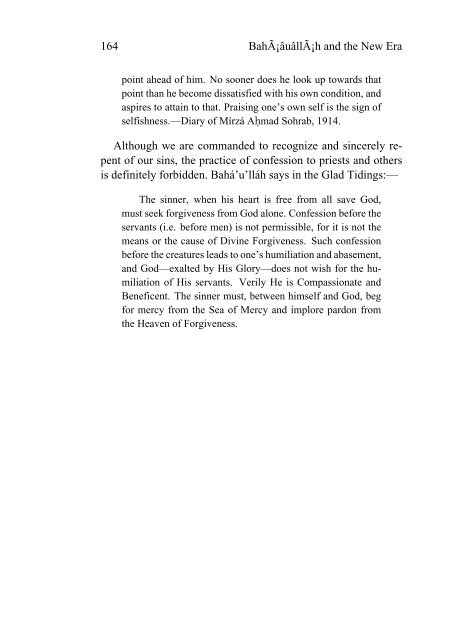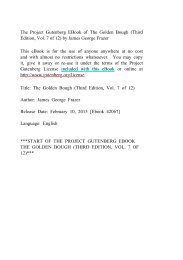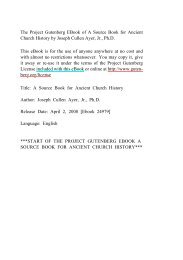- Page 1:
The Project Gutenberg EBook of Bah
- Page 5:
Baha'i Terms of UseYou have permiss
- Page 8 and 9:
viiiBaháâuâlláh and the New
- Page 10 and 11:
xBaháâuâlláh and the New Er
- Page 12 and 13:
xiiBaháâuâlláh and the New
- Page 15:
Preface to 1937 EditionWith the pub
- Page 19:
Preface to 1970 EditionSince 1937 n
- Page 22 and 23:
8 Baháâuâlláh and the New E
- Page 25 and 26:
The Greatest Event in HistoryIf we
- Page 27 and 28:
The Changing WorldThat the world, d
- Page 29 and 30:
The Sun of RighteousnessWhat is the
- Page 31:
The Mission of Bahá’u’lláhBah
- Page 34 and 35:
20 Baháâuâlláh and the New
- Page 37 and 38:
Proofs of ProphethoodBahá’u’ll
- Page 39 and 40:
Difficulties of InvestigationThere
- Page 41:
Aim of BookThe endeavor in the foll
- Page 45 and 46:
Birthplace of the New RevelationPer
- Page 47 and 48:
Early LifeMírzá ‘Alí Mu%ammad,
- Page 49:
DeclarationOn reaching His twenty-f
- Page 53 and 54:
Claims of the BábThe hostility aro
- Page 55:
Persecution IncreasesIn consequence
- Page 58 and 59:
44 Baháâuâlláh and the New
- Page 61 and 62:
Writings of BábThe Writings of the
- Page 63:
He Whom God Shall Make ManifestThe
- Page 67:
Social and Ethical TeachingsIn His
- Page 71:
Chapter 3: Bahá’u’lláh: The G
- Page 74 and 75:
60 Baháâuâlláh and the New
- Page 76 and 77:
62 Baháâuâlláh and the New
- Page 79 and 80:
Two Years in the WildernessAbout a
- Page 81 and 82:
Opposition of MullásAfter His retu
- Page 83:
Declaration at Ridván 14 near Bagh
- Page 87 and 88:
Letters to KingsAbout this time Bah
- Page 89:
Imprisonment in AkkáAt that time A
- Page 93 and 94:
Prison Gates OpenedEven when the im
- Page 95 and 96:
Prison Gates Opened 81he kept on pl
- Page 97 and 98:
Life at BahjíHaving in His earlier
- Page 99:
Life at Bahjí 85annulled—what ha
- Page 103 and 104:
Prophethood of Bahá’u’lláhIt
- Page 105 and 106:
Prophethood of Bahá’u’lláh 91
- Page 107 and 108:
Prophethood of Bahá’u’lláh 93
- Page 109 and 110:
His MissionBahá’u’lláh’s mi
- Page 111 and 112:
His WritingsThe Writings of Bahá
- Page 113 and 114:
The Bahá’í SpiritFrom His place
- Page 115:
Chapter 4: ‘Abdu’l-Bahá: TheSe
- Page 118 and 119:
104 Baháâuâlláh and the New
- Page 120 and 121:
106 Baháâuâlláh and the New
- Page 122 and 123:
108 Baháâuâlláh and the New
- Page 125 and 126:
Strict Imprisonment RenewedIn conse
- Page 127 and 128: Strict Imprisonment Renewed 113self
- Page 129 and 130: Turkish Commissions of Investigatio
- Page 131 and 132: Western ToursAfter His release, ‘
- Page 133 and 134: Return to Holy LandHe was then in H
- Page 135: Return to Holy Land 121Both during
- Page 138 and 139: 124 Baháâuâlláh and the New
- Page 141: Last YearsDuring the winter of 1919
- Page 144 and 145: 130 Baháâuâlláh and the New
- Page 147 and 148: Station of ‘Abdu’l-BaháThe uni
- Page 149: Station of ‘Abdu’l-Bahá 135bel
- Page 153: Chapter 5: What is a Bahá’íMan
- Page 157 and 158: Devotion to GodIn order to attain t
- Page 159 and 160: Search After TruthBahá’u’lláh
- Page 161 and 162: Love of GodTo know the Manifestatio
- Page 163: Love of God 149But these others mus
- Page 166 and 167: 152 Baháâuâlláh and the New
- Page 168 and 169: 154 Baháâuâlláh and the New
- Page 171 and 172: TeachingThe real Bahá’í will no
- Page 173 and 174: Courtesy and ReverenceBahá’u’l
- Page 175 and 176: The Sin-covering EyeOn no subject a
- Page 177: HumilityWhile we are commanded to o
- Page 182 and 183: 168 Baháâuâlláh and the New
- Page 185 and 186: Conversation with God“Prayer,”
- Page 187 and 188: The Devotional AttitudeIn order tha
- Page 189 and 190: Necessity for a MediatorAccording t
- Page 191 and 192: Prayer Indispensable and Obligatory
- Page 193: Congregational PrayerThe prayers wh
- Page 197 and 198: Deliverance from CalamitiesAccordin
- Page 199: Prayer and Natural LawMany find a d
- Page 202 and 203: 188 Baháâuâlláh and the New
- Page 204 and 205: 190 Baháâuâlláh and the New
- Page 207: Body and SoulAccording to the Bahá
- Page 211: Simple Life‘Abdu’l-Bahá says:
- Page 215: EnjoymentsThe Bahá’í teaching i
- Page 219 and 220: Effect of Obedience to PropheticCom
- Page 221 and 222: The Prophet as PhysicianWe live in
- Page 223: The Prophet as Physician 209It is t
- Page 226 and 227: 212 Baháâuâlláh and the New
- Page 229 and 230:
Attitude of the PatientIn order tha
- Page 231 and 232:
The HealerThe power of spiritual he
- Page 233:
How All Can HelpThe work of healing
- Page 237:
Right Use of HealthIn concluding th
- Page 241 and 242:
Sectarianism in the Nineteenth Cent
- Page 243:
The Message of Bahá’u’lláhIt
- Page 246 and 247:
232 Baháâuâlláh and the New
- Page 248 and 249:
234 Baháâuâlláh and the New
- Page 251 and 252:
Progressive RevelationA great stumb
- Page 253:
Progressive Revelation 239which has
- Page 256 and 257:
242 Baháâuâlláh and the New
- Page 258 and 259:
244 Baháâuâlláh and the New
- Page 260 and 261:
246 Baháâuâlláh and the New
- Page 262 and 263:
248 Baháâuâlláh and the New
- Page 264 and 265:
250 Baháâuâlláh and the New
- Page 267 and 268:
No Professional PriesthoodOne other
- Page 269:
Chapter 9: True CivilizationO peopl
- Page 272 and 273:
258 Baháâuâlláh and the New
- Page 274 and 275:
260 Baháâuâlláh and the New
- Page 276 and 277:
262 Baháâuâlláh and the New
- Page 279 and 280:
Political FreedomAlthough advocatin
- Page 281:
Rulers and SubjectsBahá’u’llá
- Page 285 and 286:
Economic ProblemsThe Bahá’í tea
- Page 287:
Public Finance‘Abdu’l-Bahá sug
- Page 291:
Work for AllOne of the most importa
- Page 295 and 296:
No Industrial SlaveryIn the Book of
- Page 297:
Bequest and InheritanceBahá’u’
- Page 300 and 301:
286 Baháâuâlláh and the New
- Page 303:
Women and the New AgeWhen woman’s
- Page 307 and 308:
EducationEducation—the instructio
- Page 309:
Innate Differences of NatureIn the
- Page 313:
Arts, Sciences, and CraftsTraining
- Page 316 and 317:
302 Baháâuâlláh and the New
- Page 319:
Chapter 10: The Way to PeaceToday,
- Page 322 and 323:
308 Baháâuâlláh and the New
- Page 325 and 326:
Religious PrejudicesIn order to see
- Page 327:
Religious Prejudices 313educated, t
- Page 330 and 331:
316 Baháâuâlláh and the New
- Page 332 and 333:
318 Baháâuâlláh and the New
- Page 334 and 335:
320 Baháâuâlláh and the New
- Page 337 and 338:
Universal League of NationsAnother
- Page 339 and 340:
International ArbitrationBahá’u
- Page 341:
Limitation of Armaments‘Abdu’l-
- Page 344 and 345:
330 Baháâuâlláh and the New
- Page 346 and 347:
332 Baháâuâlláh and the New
- Page 348 and 349:
334 Baháâuâlláh and the New
- Page 351 and 352:
Monastic LifeBahá’u’lláh, lik
- Page 353 and 354:
MarriageThe Bahá’í teachings en
- Page 355:
DivorceIn the matter of divorce, as
- Page 358 and 359:
344 Baháâuâlláh and the New
- Page 360 and 361:
346 Baháâuâlláh and the New
- Page 363:
Bahá’í Feasts, Anniversaries, a
- Page 366 and 367:
352 Baháâuâlláh and the New
- Page 368 and 369:
354 Baháâuâlláh and the New
- Page 370 and 371:
356 Baháâuâlláh and the New
- Page 373 and 374:
Mashriqu’l-Adhkár 34Bahá’u’
- Page 375:
Mashriqu’l-Adhkár 361When these
- Page 378 and 379:
364 Baháâuâlláh and the New
- Page 381 and 382:
Heaven and HellBahá’u’lláh an
- Page 383 and 384:
Oneness of the Two WorldsThe unity
- Page 385:
Oneness of the Two Worlds 371suppli
- Page 388 and 389:
374 Baháâuâlláh and the New
- Page 391 and 392:
Conflict Due to ErrorOne of the fun
- Page 393 and 394:
Persecution of ProphetsThe great Pr
- Page 395 and 396:
The Dawn of ReconciliationIn the la
- Page 397:
The Dawn of Reconciliation 383Moses
- Page 400 and 401:
386 Baháâuâlláh and the New
- Page 403 and 404:
The Divine ManifestationsAll things
- Page 405 and 406:
CreationBahá’u’lláh teaches t
- Page 407 and 408:
The Evolution of ManBahá’u’ll
- Page 409 and 410:
Body and SoulThe Bahá’í teachin
- Page 411:
Unity of Mankind“Ye are all fruit
- Page 414 and 415:
400 Baháâuâlláh and the New
- Page 417 and 418:
Interpretation of ProphecyThe inter
- Page 419:
The Coming of the LordThe “Coming
- Page 422 and 423:
408 Baháâuâlláh and the New
- Page 424 and 425:
410 Baháâuâlláh and the New
- Page 426 and 427:
412 Baháâuâlláh and the New
- Page 428 and 429:
414 Baháâuâlláh and the New
- Page 431 and 432:
The Day of JudgmentChrist spoke muc
- Page 433 and 434:
The Great ResurrectionThe Day of Ju
- Page 435 and 436:
Return of ChristIn many of His conv
- Page 437 and 438:
The Time of the EndChrist and His a
- Page 439:
The Time of the End 425and hatred a
- Page 442 and 443:
428 Baháâuâlláh and the New
- Page 445 and 446:
Manner of ComingAs to the manner of
- Page 447 and 448:
Manner of Coming 433have befallen e
- Page 449:
Manner of Coming 435Bahá’u’ll
- Page 453 and 454:
Creative Power of God’s WordGod,
- Page 455 and 456:
Creative Power of God’s Word 441c
- Page 457 and 458:
Napoleon IIIIn the year 1869 Bahá
- Page 459 and 460:
Napoleon III 445gladness, turn his
- Page 461 and 462:
Napoleon III 447of the hands of the
- Page 463 and 464:
AmericaIn the Book of Aqdas, reveal
- Page 465:
The Great WarBoth Bahá’u’lláh
- Page 468 and 469:
454 Baháâuâlláh and the New
- Page 470 and 471:
456 Baháâuâlláh and the New
- Page 472 and 473:
458 Baháâuâlláh and the New
- Page 475 and 476:
Akká and HaifaMírzá A%mad Sohrab
- Page 477:
Chapter 15: Retrospect and Prospect
- Page 480 and 481:
466 Baháâuâlláh and the New
- Page 483 and 484:
A Glorious ProspectThe Bahá’í g
- Page 485:
Renewal of ReligionThe state of the
- Page 488 and 489:
474 Baháâuâlláh and the New
- Page 490 and 491:
476 Baháâuâlláh and the New
- Page 492 and 493:
478 Baháâuâlláh and the New
- Page 494 and 495:
480 Baháâuâlláh and the New
- Page 497 and 498:
The Administrative Order 46It has b
- Page 499 and 500:
The Administrative Order 485express
- Page 501 and 502:
The Administrative Order 487the int
- Page 503 and 504:
The Administrative Order 489the fri
- Page 505 and 506:
The Administrative Order 491placed
- Page 507 and 508:
The World Order of Bahá’u’llá
- Page 509 and 510:
The World Order of Bahá’u’llá
- Page 511 and 512:
The World Order of Bahá’u’llá
- Page 513 and 514:
The World Order of Bahá’u’llá
- Page 515 and 516:
The World Order of Bahá’u’llá
- Page 517 and 518:
EpilogueUnder the inspired guidance
- Page 519 and 520:
Epilogue 505a most fertile source o
- Page 521:
***END OF THE PROJECT GUTENBERG EBO
- Page 525 and 526:
A Word from Project GutenbergThis f
- Page 527 and 528:
The Full Project Gutenberg License
- Page 529 and 530:
The Full Project Gutenberg License
- Page 531 and 532:
The Full Project Gutenberg License
- Page 533 and 534:
The Full Project Gutenberg License
- Page 535 and 536:
The Full Project Gutenberg License
- Page 537 and 538:
The Full Project Gutenberg License
















